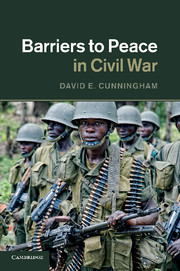Book contents
- Frontmatter
- Contents
- List of figures
- List of tables
- Acknowledgements
- List of acronyms
- 1 Introduction
- 2 A veto player theory of conflict bargaining
- 3 Testing the effect of veto players on duration
- 4 Bargaining and fighting in Rwanda and Burundi
- 5 The effects of veto players on conflict severity, genocide, and the duration of peace
- 6 Designing peace processes in multi-party civil wars
- 7 Conclusion
- Appendix A Civil wars included in the dataset
- Appendix B Descriptive statistics for variables in quantitative analyses
- References
- Index
5 - The effects of veto players on conflict severity, genocide, and the duration of peace
Published online by Cambridge University Press: 05 October 2012
- Frontmatter
- Contents
- List of figures
- List of tables
- Acknowledgements
- List of acronyms
- 1 Introduction
- 2 A veto player theory of conflict bargaining
- 3 Testing the effect of veto players on duration
- 4 Bargaining and fighting in Rwanda and Burundi
- 5 The effects of veto players on conflict severity, genocide, and the duration of peace
- 6 Designing peace processes in multi-party civil wars
- 7 Conclusion
- Appendix A Civil wars included in the dataset
- Appendix B Descriptive statistics for variables in quantitative analyses
- References
- Index
Summary
Conflicts are longer when they contain more veto players. Chapter 3 showed that a civil war is nearly four times as likely to last thirteen years when it contains four veto players as when it has two. These conflicts are longer because more veto players make bargaining harder, leaving combatants less able or willing to negotiate an end to warfare. Chapter 4 showed that the two combatants in Rwanda came to the negotiating table early, were able to use their performance on the battlefield to come to realistic assessments of the level of concessions they needed to offer/demand, and were thus able to sign an agreement that could have ended the conflict. In Burundi, by contrast, conflict lasted for years before negotiations, and these negotiations dragged on for a decade before all significant rebel groups had exited the conflict.
These are important findings, because scholars and policymakers do – and should – care about the duration of civil wars. Long civil wars cost many lives, leave economies wrecked, spill across borders, and contribute to failed states, which can represent security threats to countries far away. How long civil wars last is certainly not the only important question; those of us interested in conflict processes and conflict resolution are also interested in other normative impacts of conflict, including how severe the fighting is, whether fighting involves or is followed by genocide, and how long peace lasts in the aftermath of some agreement.
- Type
- Chapter
- Information
- Barriers to Peace in Civil War , pp. 183 - 201Publisher: Cambridge University PressPrint publication year: 2011



